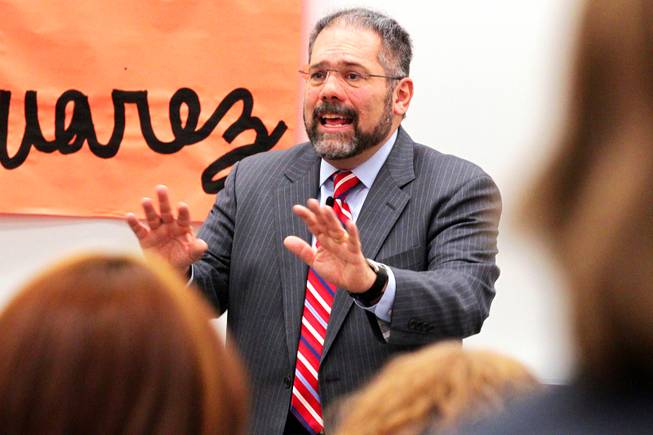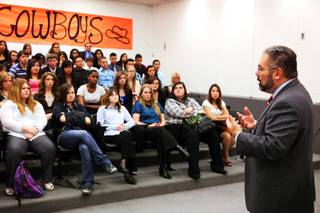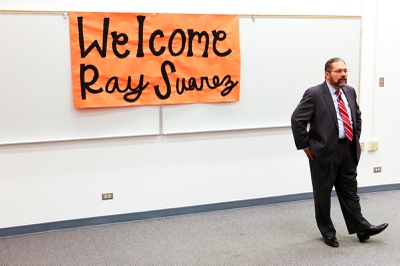
Ray Suarez of PBS NewsHour speaks with Chaparral High School students about graduation rates and education at the school in Las Vegas on Wednesday, March 28, 2012
Thursday, March 29, 2012 | 2 a.m.
Ray Suarez realizes the incredible challenge and opportunity facing him, standing before a group of 75 students gathered in a large Chaparral High School lecture hall early on a Wednesday morning.
The “PBS NewsHour” senior correspondent was invited to speak before the teenagers to expound upon the importance of finishing their education and changing the economic landscape of this financially beleaguered city.
It’s a tall order at Chaparral.
The eastern valley “turnaround” school has a 33 percent graduation rate, the lowest in the Clark County School District. Three months until graduation, an estimated 100 seniors — about one in five — have yet to pass all of their proficiency exams, a requirement to receive their diploma. Others are still so far behind on their class credits, they may need to come back in the summer or take a fifth year to finish high school.
Suarez — wearing a grey pinstripe suit with a striped red tie — shifts his weight between his feet as he begins addressing the students, a mix of white and black, Latino and Asian faces staring back at him. He understands his message isn’t reaching those who need it most — high school dropouts. He also knows he can’t connect with each and every student on an individual level during his hour-long discussion — but it can’t hurt to try.
Growing up in Brooklyn, Suarez was one of the kids pulled out of classes in high school to hear someone “old” talk about why it’s important to graduate and go on to college, he told his rapt audience in his trademark New York accent. As a veteran of these sessions, Suarez, 55, knows there’s a fair amount of rolling of eyes and exasperated sighs from teenagers who are forced to sit and listen to speeches about the value of getting an education.
“I know I can’t convince all of you in 15 minutes on a Wednesday morning, but high school is incredibly important,” he said. “ If you don’t bother to get an education, life happens to you instead of with you. You have less control over your life. … Who wants to choose a life without any choices?”
Suarez’s parents were immigrants who came to New York from an impoverished farming community in Puerto Rico in hopes to better their lives, he said.
Suarez went to an integrated urban high school, much like Chaparral, he said. There were fights, and the “atmosphere (was) not the best place to be,” he added. But he didn’t despair; Suarez channeled his energy toward making something out of himself.
“You’ve got to play the hand you’ve got,” he said. “You’ve got to work with the life you’ve been given and make the best of what you’ve got.”
Suarez said he worked hard in high school, scoring well enough on the New York Regents exams to earn a couple of scholarships and grants to attend New York University. While those funds helped, Suarez said he still had to work 36 hours a week at a Manhattan hotel and store to make ends meet. During his hour-long subway commutes between Brooklyn, where he lived, and Manhattan, where he worked, Suarez studied African history.
Simultaneously studying and working to pay for school was “not in any way fun,” he said, but in the end, it paid off. His education helped him launch a 30-year career in journalism, he said.
“I did what I could when I could,” he said. “After four years of tough times, it’s 40 years of better times.”
Suarez became the first Latino correspondent at ABC Network News in the 1980s and went on to host shows on Public Radio International and National Public Radio. His foray into television broadcasting, which included stints at CNN and an NBC affiliate news station in Chicago, helped him land his current position at “PBS NewsHour,” he said.
His career has taken him to Rome, where he covered the assassination attempt on Pope John Paul II, and to South Africa, where he reported on the last campaign rally before Nelson Mandela was elected the country’s first democratic president. He is currently writing his third book, he said.
“This is why, when I was 15, I wanted to become a journalist,” Suarez said, his voice rising as he recalled witnessing 85,000 fans cheering Mandela on. “It was the most exciting, most fabulous freaking thing I’ve seen in my life. … (My plan) worked.”
Asked by a young student if he had any doubts about what he could accomplish as a young boy raised from modest means, Suarez paused.
“Only all the time,” he said, adding that his journey wasn’t unique or special. Although there were ups and downs — including a six-month spate of unemployment between jobs — his belief in the American Dream carried through, he said.
Suarez’s son is graduating later this year from the University of Chicago, also his graduate school alma mater. Suarez recalled his grandfather remarking how incredible it was that only one generation separated his life on a Puerto Rico farm to his grandson graduating from a top-ranked university.
“America is a transformational place,” Suarez said. “This is a country of second chances. If you decide to finish (high school), you can finish.”
Despite crediting his success to his education, Suarez was adamant the end goal of a diploma wasn’t always about the financial gain. So much of the debate surrounding graduation rates hinges on the difference in lifetime earnings between high school graduates and dropouts, but it’s more than that, he said. People with a high school diploma are more likely to vote and be engaged in their community, Suarez said.
“You won’t have the knowledge to influence and change the world,” he said, raising the upcoming presidential election and the budget woes facing the School District.
Suarez also had some practical advice — or warning — for Chaparral students: Don’t saddle on exorbitant student loan debt for college, he said, adding the average college loan debt is now $22,000.
“Borrowing money to buy reputation — that’s not a good idea,” Suarez said. “It’s like starting life with a mortgage but without a house or apartment.”
Chaparral freshman Liliet Torres, 14, said she could relate with Suarez. Torres hopes to become the first in her family to graduate from college and become a university-level art teacher.
“It interested me when he talked about second chances,” she said. “Many kids think there are no second chances. I’m glad to know if I don’t get it right the first time, I can get it right the second time. I can learn from my mistakes.”
Chaparral Principal Dave Wilson said he appreciated Suarez’s efforts to reach out to the students. It’s been a difficult process to turn around the school, which has been branded with the stigma of an at-risk school, he said. However, Suarez’s visit is a positive step toward Chaparral’s turnaround efforts, he said.
“This will help by validating kids’ efforts,” Wilson said. “This is now a clean campus where kids are in class and care about education.”
Chaparral High School has seen better days.
Once among the top performing schools in the Clark County School District, Chaparral High is undergoing changes to counter dismal test scores and the lowest graduation rate in the district.
The campus located near East Flamingo Road and U.S. 95 is one of five turnaround schools not meeting the expectations outlined in No Child Left Behind.
Chaparral is now looking to clean up its reputation, touching every aspect of the school from restrooms to test scores.
Changes weren’t received well by students who openly protested the cuts to faculty and the new order that banned the use of cell phones and music players during the school day.
Under stricter rules, tardy students are locked out of classrooms, bathroom breaks during class time aren’t allowed and the lunch hour was pushed back to 1:40 p.m.
Superintendent Dwight Jones told students he’s not settling for half successes.
“Right now, 50 percent of the kids in this school don’t graduate high school. Is that acceptable to you? Think about that. Right now, some of the friends that you’re with aren’t going to graduate. Is that OK? That’s unacceptable to me. I think you guys ought to kick all of us out.”
- Year built:
- 1971
- Mascot:
- Cowboys
- Principal (Year Hired):
- David Wilson (2011)
- Enrollment:
- Approximately 2,250
- School Report Card:
- 2010-2011
Compiled by Gregan Wingert



Join the Discussion:
Check this out for a full explanation of our conversion to the LiveFyre commenting system and instructions on how to sign up for an account.
Full comments policy